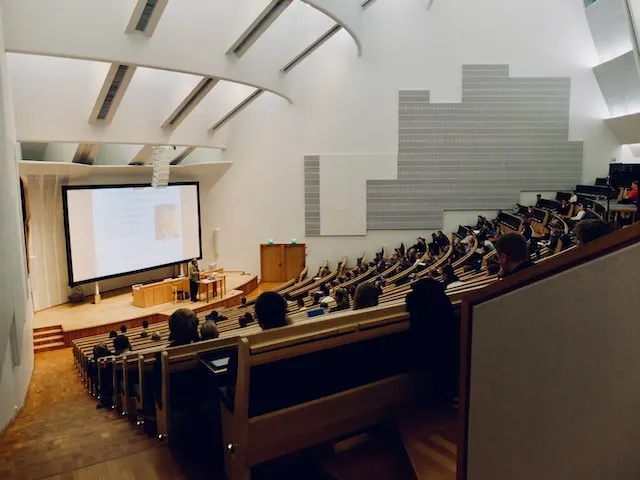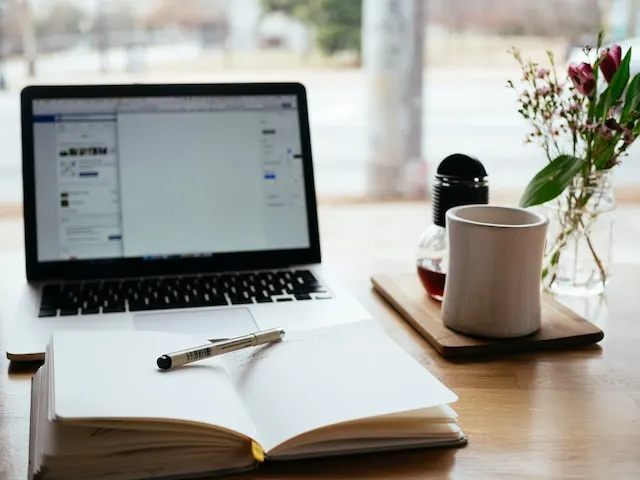30. May 2023
Take notes or listen during lectures ?
Ah, the age-old question of note-taking versus listening during lectures. It is the academic equivalent of the chicken and the egg conundrum - which one comes first, or in this case, which one leads to better learning?
While we can’t solve the mystery of the universe, we can certainly shed some light on the pros and cons of both approaches. So, grab a pen and paper - or don’t, if you’re feeling rebellious - and let’s dive into the debate!”
Take Notes or Listen?
The question of whether to take notes or listen during lectures is one that has been debated for years. Some argue that taking notes helps with retention and recall, while others believe that listening actively to the material is more effective. With the advent of technology, note-taking has also evolved. Students opt to type their notes on laptops or take pictures of the lecturer’s slides.
You can’t just listen to lectures or just take notes. Your brain can’t remember everything, so you need notes to review later. But if you only focus on writing, you won’t absorb the material deeply or be able to see the larger picture in the class. You need to absorb as much knowledge as possible in the given time. Note-taking lets you personalize your notes and engage actively with the material. Listening reduces cognitive overload, improves comprehension, and enables questions and discussions. The ideal approach depends on many factors, including your learning style and the lecture’s content.
In this article, we will explore both sides of the argument and offer tips on finding the right balance between note-taking and listening.

Why Take Notes?
Taking notes during lectures has been a tried and tested method of learning for decades. It is a practice that has been shown to have many benefits. Let’s take a look at some examples.
Better retention and recall
When you take notes, you engage actively with the material being presented. This helps you to process the information more thoroughly and retain it better. In fact, research has shown that students who take notes during lectures tend to remember more of the material than those who don’t.
Active engagement with the material
Note-taking requires you to pay close attention to the lecture and process the information in real-time. This active engagement with the material helps you to understand it better and to identify key concepts and ideas.
Personalized notes for future reference
Notes are a great resource to refer to when studying for exams or working on assignments. They allow you to revisit the material and refresh your memory on key points. Moreover, personalized notes that you have taken yourself are often easier to understand and recall than generic study materials.
So, taking notes helps you to process the information better, stay engaged with the material, and provides a useful resource for future reference.

The case for listening
While taking notes has its benefits, there are also advantages to simply listening to lectures. Let’s examine some.
Reduced cognitive load:
Note-taking can be a mentally taxing activity that requires constant attention and multitasking. In contrast, listening alone can reduce cognitive load and help you focus more fully on processing the information being presented. This can lead to a more relaxed and enjoyable learning experience.
Consider this example: if you’re driving and listening to a lecture, taking notes is not an option. In such cases, listening alone can be an effective way to learn and retain information.
Improved comprehension and understanding:
When you listen to a lecture without the distraction of note-taking, you can concentrate fully on the content being presented. This can lead to a deeper and more nuanced understanding of the material, as you are able to process it in real-time and make connections between different concepts and ideas.
Moreover, listening can help you pick up on important nuances like tone of voice, emphasis, and inflection that may not be captured in written notes.
Ability to ask questions and participate in discussions:
When you’re not focused on taking notes, you have more mental bandwidth to engage with the lecturer and ask questions. This can help clarify any confusing or unclear points and lead to a more interactive and engaging learning experience. Additionally, participating in discussions with classmates can deepen your understanding of the material and expose you to different perspectives.
In short, while note-taking has its benefits, listening alone can reduce cognitive load, improve comprehension and understanding, and allow for active participation and discussion.
Finding the balance
When it comes to taking notes versus listening during lectures, there is no one-size-fits-all approach. Instead, it is important to find a balance that works for you. Here are some tips for doing so.
The Importance of Individual Learning Styles
Everyone has a unique learning style, and what works for one person may not work for another. Some people are visual learners who benefit from diagrams and illustrations, while others are auditory learners who prefer to listen to explanations. Still, others are kinesthetic learners who need to physically engage with the material in order to understand it.
Identifying your learning style can help you determine which note-taking and listening strategies will work best for you.
Strategies for Combining Note-Taking and Listening:
For many students, a combination of note-taking and listening is the most effective approach. Here are some strategies for combining the two:
- Use abbreviations and shorthand to take notes more quickly
- Focus on writing down key concepts and ideas rather than trying to capture everything
- Try to anticipate what the lecturer will say next and take notes accordingly
- Use different colors and formatting to highlight important points
Tips for Maximizing Learning During Lectures:
No matter which approach you take, there are some general tips that can help you maximize your learning during lectures. These include:
- Come prepared with any necessary materials, such as a notebook or laptop
- Sit in aposition where you can see and hear the lecturer clearly
- Stay focused and engaged by taking breaks if necessary
- Participate in discussions and ask questions when appropriate
- Review and organize your notes soon after the lecture to solidify your understanding
Conclusion
In conclusion, the question of whether to take notes or listen during lectures is a complex one and the answer varies from one individual to another. Here’s a recap of the main points covered in this article:
- Note-taking allows for personalized notes for future reference, active engagement with the material, and better retention and recall.
- Listening can reduce cognitive load, improve comprehension and understanding, and enable students to ask questions and participate in discussions.
- The best approach may depend on individual learning styles and the specific lecture or course material.
- Strategies for finding the right balance between note-taking and listening include identifying your learning style, using shorthand and highlighting, and staying focused and engaged.
No matter which approach you take, it’s important to stay focused and engaged during lectures, participate in discussions, and review your notes soon after the lecture to solidify your understanding. Furthermore, it’s important to find a balance between note-taking and listening that works for you. By using strategies like shorthand and highlighting, you can take effective notes while staying engaged with the material. At the same time, taking breaks and actively participating in discussions can help you stay focused and maximize your learning.
By finding the right balance between note-taking and listening, you can get the most out of your lectures and improve your overall academic performance. Ultimately, the best approach may depend on individual learning styles and the specific lecture or course material. It is important to experiment with different methods and find what works best for you.
Vizle helps in studying and taking notes efficiently from prerecorded sessions. Using these student-friendly digital notes (PDF or PPT) will surely make learning more fun and efficient.
Read more
How to Convert a Video to PDF?